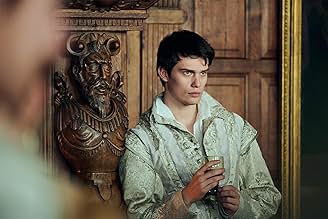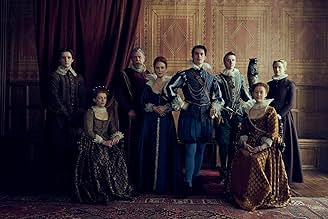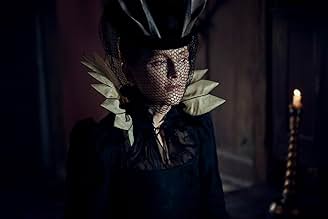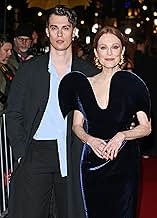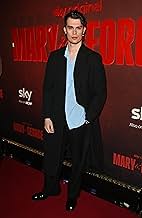Mary & George
- Miniserie de TV
- 2024
- 1h
Siga la historia de la condesa de Buckingham que moldeó a su hijo para seducir al rey y convertirse en su todopoderosa amante, a través de intrigas, llegando a ser más rica, con más títulos ... Leer todoSiga la historia de la condesa de Buckingham que moldeó a su hijo para seducir al rey y convertirse en su todopoderosa amante, a través de intrigas, llegando a ser más rica, con más títulos e influyente que se haya visto jamás.Siga la historia de la condesa de Buckingham que moldeó a su hijo para seducir al rey y convertirse en su todopoderosa amante, a través de intrigas, llegando a ser más rica, con más títulos e influyente que se haya visto jamás.
- Nominado a 1 premio Primetime Emmy
- 11 nominaciones en total
Explorar episodios
Opiniones destacadas
Julianne Moore is wickedly delicious as Mary Villiers, a somewhat noble mother of four who had her sights set on rising above the ranks of nobility with the help of her son, George (cheeky performance from Nicholas Galitzine, who at last sinks his teeth into a real role).
Together, mother and son plot and weave their way through the depraved King Charles' court (Tony Curran effective as the king). What unveils before ones very eyes will fascinate those who seek not to judge, but watch in a perverse sense of wonderment how this all took place in the 17th century.
Creator and writer, D. C. Moore, has crafted a telling tale of what could have occurred behind the King's golden secret doors, delivering treachery of the highest order and other wild shenanigans one has to endure in order to climb that royal social ladder.
Together, mother and son plot and weave their way through the depraved King Charles' court (Tony Curran effective as the king). What unveils before ones very eyes will fascinate those who seek not to judge, but watch in a perverse sense of wonderment how this all took place in the 17th century.
Creator and writer, D. C. Moore, has crafted a telling tale of what could have occurred behind the King's golden secret doors, delivering treachery of the highest order and other wild shenanigans one has to endure in order to climb that royal social ladder.
This tale of England and Scotland's homosexual king James I and his favourite and lover, George Villiers, Duke of Buckingham, might look the part but there are too many aspects to it which can only deserve the well-known observation 'nice try, but no cigar'.
This series is like those tomatoes we are offered these days in the vegetable section of too many superstores: they look the part and are certainly pretty, but all too often they taste of very little but water, and mot certainly not of tomatoes.
That analogy is not as silly as it sounds: shop for tomatoes in a Southern European small-town market and you will be offered horribly misshapen specimens, but by God they taste great and do taste of tomato.
We spoiled shoppers, however, are put off aesthetically by such misshapen fruit and lazily settle for tasteless specimens which, however, look fantastic.
That pretty much sums up Mary & George: with its authentic looking sets (filmed in various Jacobean manor houses in England), sumptuous costumes and its cod-Shakespearean dialogue, many might feel Mary & George is the real deal.
But it is nothing of the kind: essentially it is bog-standard soap opera drama portentously puffed up to seem profound, whereas for too many reasons it is nothing but an expensively produced soap opera with pretensions it never lives up to.
The first, and perhaps most important, point to make is that it is fiction. This is not history. Other reviewers have warned that many watching this will imagine it is 'history' and I shall repeat that warning: this is pure fiction involving real historical characters.
Yes, James I was homosexual, and although he fathered eight children by his wife Anne of Denmark (of whom four died in infancy and his eldest son and heir died at 18) and thus might be classed as bisexual, he and Anne lived separate lives and his main inclination was gay.
He was quite open about his sexuality and did not stint himself in public with his gay courtiers. Modern apologists, in a curious form of homophobia, like to argue along the lines that 'we don't understand the kind of male friendships in the 16th and 17th centuries' and that his kind of behaviour was not necessarily gay.
Yes, it was, and James was often the butt of ribald jokes and ballads by what are often condescendingly called 'the lower orders', but he didn't care one jot.
However, the kind of rampant sexual behaviour depicted in Mary & George is fictional: James was very conscious of his 'royal status' - he 'was the king' and people had better believe it - and he would not have jeopardised his role in such a blatant public way.
It is also very probable that George Villiers was mainly gay, and he and James were known to have been very close, with a discrete passageway connecting his rooms to Villiers'. But the arrangement and goings-on set out in the TV series are occasionally ludicrous.
The novel upon which the series is based suggests that Villiers mother Mary patiently schemed to get her son, metaphorically, into James's bed. That scheming is demonstrated in the series, but all the machinations we are asked to believe are never convincing.
The evolution of George from something of a wimp into one of if not the most powerful man in England for a while is portrayed in such a cack-handed fashion that we can't quite bring ourselves to believe it (and thus as drama the piece falls at the first hurdle).
Other aspects of the series are also fatally flawed: we are presented with characters who speak, both in content and manner, in a pseudo-Jacobean fashion, but the writers also have them incessantly effing and blinding and using the C word like dockworkers. And it is incessant and even Mary does it.
It's as though the producers wanted 'an historical piece', but also wanted 'to make it modern'. That's about the only explanation I can give. It ends up being simply silly.
OK, this is fiction, but Francis Bacon would certainly not had wandered around the streets of London (though the same street is put to work several times as it happens) alone as he is shown to do.
Mary might well have had a lesbian relationship - why not, many women do. But it is a cliche too far to have her striking up such a relationship with a woman who was either a brothel madam or even just a simple prostitute. Mary was far too conscious of her status and she would not have ventured into a brothel on her own in the first place.
The vicissitudes of her rise to power are also so convoluted as at times to be more than a little incomprehensible. And would she really have, after being a scorned woman, so miraculously become such a power at court? Don't think so.
As for her supposed gay relationship (which is somewhat gratuitous as it serves no dramatic function at all), it is doubly unlikely in that in the Jacobean era and for the next two hundred years at least the class distinctions were not only vast but important to those at the top. There was no mingling 'with the plebs' by 'nobility'.
If a gay noble wanted a quick spot of how's our father, there were plenty of other gay nobles or palace staff to have it on with without trawling the streets. And it would not have taken place in one of the palace corridors.
It occurs to me that in the muddled thinking of the producers, what with rather a lot of flash-forwards and flash-backs and folk suddenly appearing, Mary & George was perhaps intended as some kind of 'art piece'. Well, it that was the case they get nul points.
At the end of the day one might argue that my gripes are irrelevant because, after all, this is 'only fiction'. To that I would respond 'fine, but overall what with this flaw and that anachronism - the constant use of the F and C words - it is rather badly made fiction.
It might look the part, but it does not convince.
This series is like those tomatoes we are offered these days in the vegetable section of too many superstores: they look the part and are certainly pretty, but all too often they taste of very little but water, and mot certainly not of tomatoes.
That analogy is not as silly as it sounds: shop for tomatoes in a Southern European small-town market and you will be offered horribly misshapen specimens, but by God they taste great and do taste of tomato.
We spoiled shoppers, however, are put off aesthetically by such misshapen fruit and lazily settle for tasteless specimens which, however, look fantastic.
That pretty much sums up Mary & George: with its authentic looking sets (filmed in various Jacobean manor houses in England), sumptuous costumes and its cod-Shakespearean dialogue, many might feel Mary & George is the real deal.
But it is nothing of the kind: essentially it is bog-standard soap opera drama portentously puffed up to seem profound, whereas for too many reasons it is nothing but an expensively produced soap opera with pretensions it never lives up to.
The first, and perhaps most important, point to make is that it is fiction. This is not history. Other reviewers have warned that many watching this will imagine it is 'history' and I shall repeat that warning: this is pure fiction involving real historical characters.
Yes, James I was homosexual, and although he fathered eight children by his wife Anne of Denmark (of whom four died in infancy and his eldest son and heir died at 18) and thus might be classed as bisexual, he and Anne lived separate lives and his main inclination was gay.
He was quite open about his sexuality and did not stint himself in public with his gay courtiers. Modern apologists, in a curious form of homophobia, like to argue along the lines that 'we don't understand the kind of male friendships in the 16th and 17th centuries' and that his kind of behaviour was not necessarily gay.
Yes, it was, and James was often the butt of ribald jokes and ballads by what are often condescendingly called 'the lower orders', but he didn't care one jot.
However, the kind of rampant sexual behaviour depicted in Mary & George is fictional: James was very conscious of his 'royal status' - he 'was the king' and people had better believe it - and he would not have jeopardised his role in such a blatant public way.
It is also very probable that George Villiers was mainly gay, and he and James were known to have been very close, with a discrete passageway connecting his rooms to Villiers'. But the arrangement and goings-on set out in the TV series are occasionally ludicrous.
The novel upon which the series is based suggests that Villiers mother Mary patiently schemed to get her son, metaphorically, into James's bed. That scheming is demonstrated in the series, but all the machinations we are asked to believe are never convincing.
The evolution of George from something of a wimp into one of if not the most powerful man in England for a while is portrayed in such a cack-handed fashion that we can't quite bring ourselves to believe it (and thus as drama the piece falls at the first hurdle).
Other aspects of the series are also fatally flawed: we are presented with characters who speak, both in content and manner, in a pseudo-Jacobean fashion, but the writers also have them incessantly effing and blinding and using the C word like dockworkers. And it is incessant and even Mary does it.
It's as though the producers wanted 'an historical piece', but also wanted 'to make it modern'. That's about the only explanation I can give. It ends up being simply silly.
OK, this is fiction, but Francis Bacon would certainly not had wandered around the streets of London (though the same street is put to work several times as it happens) alone as he is shown to do.
Mary might well have had a lesbian relationship - why not, many women do. But it is a cliche too far to have her striking up such a relationship with a woman who was either a brothel madam or even just a simple prostitute. Mary was far too conscious of her status and she would not have ventured into a brothel on her own in the first place.
The vicissitudes of her rise to power are also so convoluted as at times to be more than a little incomprehensible. And would she really have, after being a scorned woman, so miraculously become such a power at court? Don't think so.
As for her supposed gay relationship (which is somewhat gratuitous as it serves no dramatic function at all), it is doubly unlikely in that in the Jacobean era and for the next two hundred years at least the class distinctions were not only vast but important to those at the top. There was no mingling 'with the plebs' by 'nobility'.
If a gay noble wanted a quick spot of how's our father, there were plenty of other gay nobles or palace staff to have it on with without trawling the streets. And it would not have taken place in one of the palace corridors.
It occurs to me that in the muddled thinking of the producers, what with rather a lot of flash-forwards and flash-backs and folk suddenly appearing, Mary & George was perhaps intended as some kind of 'art piece'. Well, it that was the case they get nul points.
At the end of the day one might argue that my gripes are irrelevant because, after all, this is 'only fiction'. To that I would respond 'fine, but overall what with this flaw and that anachronism - the constant use of the F and C words - it is rather badly made fiction.
It might look the part, but it does not convince.
Juliane Moore is not a serious actress. If Meryl Streep were playing this role she would be speaking as an English woman. She would have taken the time to learn dialect. Lazy American actors speak like Americans in French and British films. Interesting that the British actors do learn how to speak like US people. Just as ridiculous is the fact that this review sight will not publish reviews unless they are around 600 letters in length. What could possibly be the non-sensical reason for that? Looks like I still don't have a mini novel's worth of words to publish this review. I went to the grocery store the other day and bought some kale and carrots and yogurt and two of those dark chocolate salty almond bars which were absolutely delicious.
I enjoyed episode 1 and from then on it went rapidly downhill until we eventually abandoned it at episode 3.
The sound on the dialogue was quite hard to make out without subtitles as it was very badly mixed. After straining to hear and then attempt to grasp what the convoluted plot was actually about it wasn't actually worth the effort.
Just another one of these tedious series which descend into a garbled mess after a promising start.
Who is actually approving the script? The costumes and the sets were fantastic so once again it's the writing that insults the viewers intelligence.
A wasted opportunity!
The sound on the dialogue was quite hard to make out without subtitles as it was very badly mixed. After straining to hear and then attempt to grasp what the convoluted plot was actually about it wasn't actually worth the effort.
Just another one of these tedious series which descend into a garbled mess after a promising start.
Who is actually approving the script? The costumes and the sets were fantastic so once again it's the writing that insults the viewers intelligence.
A wasted opportunity!
Given what the producers of this show have chosen to highlight -- the passionate love affair between King James and the Duke of Buckingham, along with countless other dalliances, treachery, lust, and basically every sin you can think of-- the show is strangely cold and distant. It's a character drama without the characters: all the participants are drawn as though from fifty feet away. We never really get into the heads of anyone, we never have a sense of their internal dialogs, we never quite get to know them outside the obvious lust for power, or sex, with which each character is aflame.
There is also the matter of historical rewriting: the show rather pretends to be based on facts, but it's really not; many of the most interesting plot developments are fictional, and much of what could have been actual, factual plot turns are left out (poor Francis Bacon comes off the worst: instead of portraying him as the fascinating and spectacular intellectual he was, here he is only a weak, ineffectual loser).
All in all, there's much to like here if you want scenery, costumes, and sets, along with some remarkable acting (especially from Samuel Blenkin and Tony Curran), but the show leaves a slightly bitter taste, as though you were expecting champagne and instead got ale.
There is also the matter of historical rewriting: the show rather pretends to be based on facts, but it's really not; many of the most interesting plot developments are fictional, and much of what could have been actual, factual plot turns are left out (poor Francis Bacon comes off the worst: instead of portraying him as the fascinating and spectacular intellectual he was, here he is only a weak, ineffectual loser).
All in all, there's much to like here if you want scenery, costumes, and sets, along with some remarkable acting (especially from Samuel Blenkin and Tony Curran), but the show leaves a slightly bitter taste, as though you were expecting champagne and instead got ale.
¿Sabías que…?
- TriviaEven given the taboos both of the historical period and of the next several centuries of research into and writing about history, there is a fair amount of historical documentation of contemporary rumors and reports that King James I (played in this series by Tony Curran) was gay, or perhaps bisexual, giving a historical basis to this aspect of his depiction in "Mary & George." His close relationships with a series of male courtiers were often remarked-upon in letters and other documents of the day. Two of the men whom many historians agree were likely his lovers are depicted in this series: Robert Carr, 1st Earl of Somerset (Laurie Davidson) and George Villiers, Duke of Buckingham (Nicholas Galitzine); Sir John Oglander, a contemporary politician and diarist, wrote that James "is the chastest prince for women that ever was, for he would often swear that he never kissed any other woman than his own queen. I never yet saw any fond husband make so much or so great dalliance over his beautiful spouse as I have seen King James over his favourites, especially the Duke of Buckingham," and a Royal Navy officer, Edward Peyton, observed James "tumble and kiss [George] as a mistress" in view of the court. James I was the same King James who sponsored the translation of the Bible that is still known today as "the King James Bible," which is another reason that religious interests may have been eager to deny or expunge from history the possibility that James was gay or bisexual.
- ErroresLord and Lady Somerset have Scottish accents when in reality the real life couple and the actors that play them were and are English.
- ConexionesFeatured in WatchMojo: Top 10 TV Shows of 2024 (So Far) (2024)
Selecciones populares
Inicia sesión para calificar y agrega a la lista de videos para obtener recomendaciones personalizadas
- How many seasons does Mary & George have?Con tecnología de Alexa
Detalles
- Fecha de lanzamiento
- País de origen
- Sitio oficial
- Idioma
- También se conoce como
- Мэри и Джордж
- Locaciones de filmación
- Productoras
- Ver más créditos de la compañía en IMDbPro
- Tiempo de ejecución1 hora
- Color
Contribuir a esta página
Sugiere una edición o agrega el contenido que falta

Principales brechas de datos
What is the Canadian French language plot outline for Mary & George (2024)?
Responda






